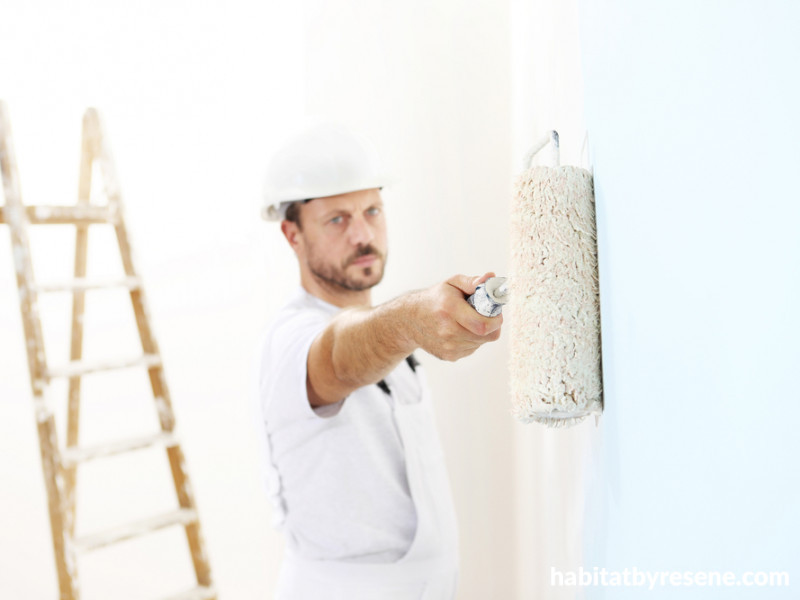
Using a painter, part 1
17 Jan 2017
Even if you’re a dab hand with a paint brush and are happy to undertake most decorating jobs, sometimes a task is just too much or you’re short on time.
As with finding any tradesperson, finding and choosing the right professional painter is key to the success of your job. Here’s some advice from the Master Painters' New Zealand Association.
Choosing a painter
It is a good idea to get quotes: three quotes will often be plenty, but use your common sense.
Compare prices and the scope of the works carefully to make sure the quote is for exactly the same work. Also carefully compare the materials being used. Differences in these can often be a reason why quotes vary. For example, how many coats is each painter proposing? Are premium line products being used?
It is often true that you get what you pay for. Better painters often charge a premium for their experience and higher quality work.
Does your contractor offer a warranty?
If so, how is this backed up? If they are a Master Painters' Association member they should discuss the optional Master Painters' Guarantee with you. Ask to see their membership card and also feel free to ask your painter for references.
What to paint?
It is up to you to tell your painter what you want done, but they can help you work out what’s best. Your painter is generally a wealth of information about painting. Ask them questions and be prepared to listen to expert advice before making the final decision.
If you have a particular purpose for which the work is required, or a specific result you want to achieve, it’s important that this is written into your contract.
For most jobs, painting doesn’t require any council approval. If you live in an old or significant area, or in a suburb with covenants, you may be required to use specific colours. You may need a permit if your painter needs to stand or erect scaffolding or ladders on the street or footpath to reach the house, or if there are electrical wires close by.
Get the right permissions before you start. Unless you agree otherwise, your painter is not responsible for approvals, and getting this aspect wrong can increase your costs.
Get it in writing
Clear documentation helps everyone. The Master Painters' Association contract has a section where all the details of the work should be fully written. Your painter will most often complete this but always check it carefully and ask questions if you don’t find it clear enough.
What’s needed will vary from job to job. If you don’t understand, don’t sign. Get it clarified.
Insurance
Always ask what insurance the painter has. Tradepeople should carry public liability insurance which covers related party damages as a result of the contracted work. A member of the Master Painters' Association must have this as a condition of membership.
Before work starts, always speak to your own insurers and let them know your plan. Consider, for example, if you have adequate cover if your possessions are stolen or damaged.
Your safety
Paint products, and the place where work is happening, can be dangerous. If you handle paint products at all, read labels and follow advice. Stay clear of work areas. Supervise children closely.
Old paint can contain lead: let the painter deal with this. A professional will need to deal with any asbestos issues if they are suspected.
Painting often generates noise, as well as fumes and fine particles which can hang in the air. If anyone in your household is sensitive to this, tell your painter early enough for them to perhaps modify how they do a job. You are the best judge of your own circumstances. Take appropriate precautions. This might include leaving the property for an appropriate time.
Did you know… that Resene VOC-free paint has no volatile organic compounds and therefore has less odour and fumes?
Painters will often leave their equipment on your property during the work (paint, ladders, tools and scaffolding). Discuss this with them upfront so you know what to expect. Don’t touch, and keep children away. If you need their equipment moved, ask the painter.
Paint and colour
Don’t skimp. Paint is not only about colour, it’s about protection.
All things being equal, a higher-quality paint lasts longer and will cover better. Don’t cut corners by choosing an inferior paint.
Make sure your painter specifies the exact materials they are using. Call the paint company and ask them if the paint is premium quality.
Painters just paint. It’s you who decides the colours and finishes. Your painter may offer an opinion on colours, especially on the light reflectance value of your choice, or suggest you contact a professional colour consultant, but it’s your choice at the end of the day.
The best way to assess a colour is to buy a Resene testpot and paint an A2 piece of card, leaving an unpainted white border. Shift the card around the room, or the outside of the house, to see it under different light conditions and at different times of the day. Seeing a larger sample of paint is much better than relying on the smaller paint chips found on paint colour charts.
Many influences determine how each of us perceives colours. For example, how you remember a wall before it was painted, the time of day, the way the sun or a light shines, the angle from which you look and what surrounds it such as other surfaces, flooring, furniture and things you hang on a wall, can all make a difference.
People perceive and describe colours and finishes differently. For example, one person’s white is often another person’s cream.
The finish of the paint can also affect the colour: gloss, semi-gloss, vinyl and matte.
You may be able to change your mind about paint colour after the work has started, but expect extra costs. You will need to, of course, pay for work done and paint bought, but also further work and new paint, especially if you switch from a darker colour or shade to a lighter colour or shade.
Getting ready for the painter
Generally, you must provide clear access to the place where the painter is working. If you’re not ready, and the painters need to move things about, it can cost more.
Discuss practicalities with your painter before they arrive, such as what is happening with:
- Furniture
- Fragile, special and valuable items
- Electrical items
- Carpet and curtains
- Light fittings
- Plants and garden beds
- Items on the walls
For example, will holes be filled and who will rehang art and the flatscreen TV?
It is usually best if you manage fragile, special and valuable items.
If you doubt the work area to be safe in any way, you must tell the painter. For example, if you suspect lead paint, asbestos, faulty electrical switches or loose steps.
Your painter must take reasonable care when painting, and take reasonable steps to protect property from usual painting risks, usually by using plastic sheets or drop cloths and reasonably protecting from overspray.
There are things a painter will not or cannot do, and they may recommend additional help. For example, managing heavy or special items, or moving or changing electrical, lighting, TV, computer, gas and water fittings and fixtures.
Most painters will put things back as nearly as is practicable in all the circumstances, although understand that it is your home and things may not always be placed back exactly as you have had them.
When they finish the job, the painters will do a final clean up and remove their things. Check if your quote includes rubbish removal, or this may be something you need to do.
You must provide reasonable access to electricity and water and, unless agreed otherwise, the cost of this is on you. Use is usually very modest. Painters appreciate being able to use an available toilet, but if this is an issue for you, let them know in advance.
Find out more about what’s involved in a professional painter’s job, here.
To find a Registered Master Painter in your area, ask your local Master Painters Association office, your local Resene ColorShop or check out the Master Painters’ website for registered painters in your area.
Published: 17 Jan 2017




